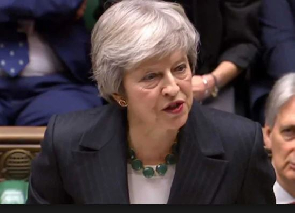- Governor Sanwo-Olu flags off Ojota-Opebi Link Bridge, to be completed in 20 months
- Allow Nigeria go to 2022 World Cup, don’t play qualifiers – Ghana Parliament member tells Black Stars
- There was no second sex tape, Kim Kardashian refutes Kanye West’s claims
- Jaruma Remanded In Prison Over Post On Regina Daniels And Ned Nwoko
- Lanre Gentry confirms paternity of last son with Mercy Aigbe, says ‘He’s my son’ (Photo)
Brexit: MPs to resume debate on PM’s plan

Theresa May is launching a fresh push to convince MPs to back her Brexit deal as they begin five days of debate.
The prime minister cancelled a vote on her deal last month at the last minute to avoid a humiliating defeat.
She is hoping new proposals on Northern Ireland will change enough MPs’ minds to save the deal.
But the DUP have already rejected the plans – and rebel Tories are planning a move that could give MPs more say over what happens if her deal is rejected.
The MPs, headed by former Tory ministers Oliver Letwin and Dominic Grieve, helped inflict a defeat on the government on Tuesday on an amendment aimed at making it more difficult to leave the EU without a deal.
Now they are planning to table another amendment that could open up alternatives to Mrs May’s deal if she loses next week’s vote.
Labour has, meanwhile, said it will table a motion of no confidence in the government if Mrs May’s deal is voted down next week.
It comes as ministers publish plans to give the Northern Ireland assembly in Stormont the power to vote against new EU rules if the border backstop comes into force after Brexit.
Mrs May is hoping that giving a greater role to the devolved government, which is currently suspended, will help her win the support of the Democratic Unionist Party for her Brexit deal.
But the DUP’s Brexit spokesman Sammy Wilson said the proposals were “meaningless” and had “no real significance”.
Mrs May’s de facto second-in-command David Lidington said he “would have been surprised had this document of itself been sufficient to shift their position”.
But he said the government would be coming forward with further proposals in the run-up to next week’s vote.
Environment Secretary Michael Gove said he was “confident” Mrs May’s Brexit deal would pass the vote, arguing that the only alternatives were a no-deal Brexit which would cause economic damage or “no Brexit”.
The UK Parliament passed legislation last year stating that the UK would leave the European Union on 29 March – two years after negotiations on its exit began.
As things stand, the UK will leave without a deal if Mrs May’s deal is rejected.
Brexiteer Conservatives argue that this would be better than Mrs May’s deal, but a cross-party group of MPs are attempting to use Parliamentary tactics to prevent it.
On the eve of Wednesday’s debate, the government suffered an embarrassing defeat when 20 Tory MPs joined forces with Labour to signal their opposition to a no-deal Brexit.
A host of former ministers, including Michael Fallon, Justine Greening and Sir Oliver Letwin, voted to amend the finance bill to restrict the ability of the Treasury to make tax changes in the event of a no deal – and threatened to target other legislation in the coming months.
The same alliance of cross-party MPs will later seek to push through an amendment that would oblige Mrs May to return to the Commons within three days with a fresh plan.
It would also enable MPs to table their own alternatives to Mrs May’s plan, which could include another referendum or measures to prevent a no-deal Brexit.
The amendment to a procedural business motion, which must be selected for debate by Commons Speaker John Bercow, is due at about 13:00 GMT, after Mrs May faces Jeremy Corbyn at Prime Minister’s Questions.
If MPs approve the business motion, the debate on the terms of the UK’s withdrawal and future relations with the EU will continue on Thursday, Friday and Monday before concluding on Tuesday, when Mrs May is expected to address MPs before the vote.
The BBC’s assistant political editor Norman Smith said ministers were under no illusion about the scale of opposition they face – but hoped to gradually chip away at the numbers ranged against them with a series of reassurances over the Northern Ireland backstop.
Further measures are expected to guarantee access to British markets and minimise any divergence between Northern Ireland and the rest of the UK.
The DUP and many Tory MPs object to the backstop, a contingency plan agreed by the UK in December 2017 which the EU has said is necessary in case the two sides do not agree their future relationship or another solution by the end of 2020.
They want the backstop to be removed entirely or a legal guarantee that the UK will be able to leave it unilaterally at a time of its choosing S